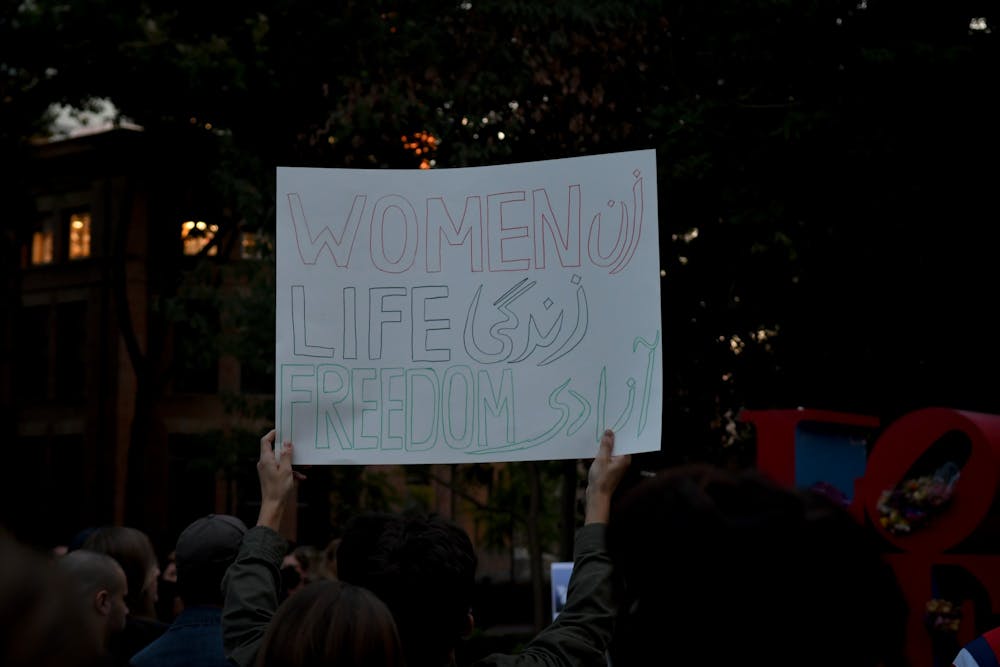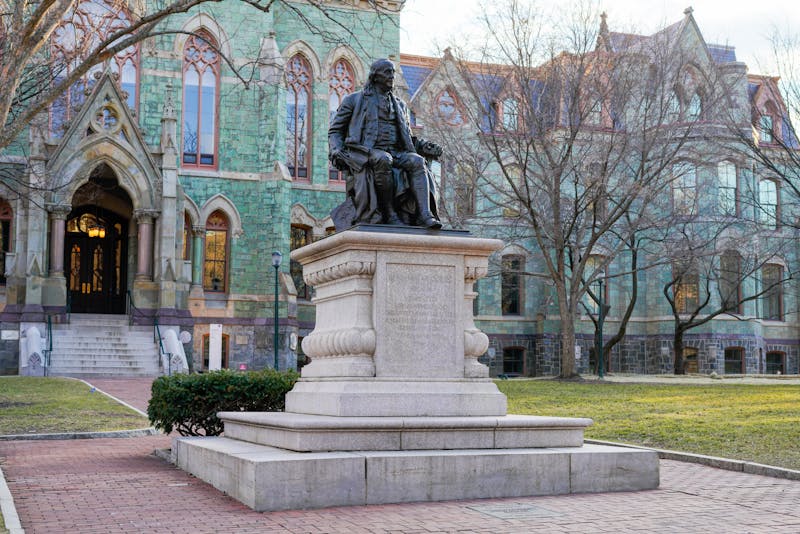
Vigil held for Amini on Sept. 29, 2022
Credit: George BotrosMembers of the Penn and West Philadelphia communities gathered Thursday evening in solidarity with Iranian women to protest the death of Mahsa Amini.
Approximately 100 people gathered at the LOVE statue on Thursday night at 6 p.m. at a vigil for Amini, who was reportedly beaten to death by Iranian morality police for failing to follow the mandatory hijab law. Since Amini’s death, which has drawn widespread media attention, thousands of Iranians have taken to the streets to protest not only the hijab law, but also authoritarianism, the oppression of women, and poor economic conditions.
The Iranian government estimates that 17 people have died since the protests began over two weeks ago, although some human rights groups place the total much higher, according to The New York Times.
At the campus demonstration, Penn professors spoke about the protests in Iran and led the crowd in chants.
Walter H. Annenberg Professor of History Firoozeh Kashani-Sabet told the crowd that the organizers of the protest and vigil could not speak or lead it because of fear of reprisal against their family members or themselves if they were to visit Iran in the future.
“These dedicated young thinkers and activists wanted to join us here on the stage this evening, and indeed more than any of us they deserve to be here and they deserve to be heard, but they fear for their safety,” Kashani-Sabet said.
Kashani-Sabet and History professor Secil Yilmaz both praised the courage of the women in Iran who are currently protesting. In their remarks, they emphasized that the movement is not just about the hijab law, but also about advocating for Iranian liberty more broadly.
“This is an uprising instigated by women, led by women, and joined by all freedom lovers around the world,” Kashani-Sabet said to the crowd. “We demand freedom of choice, freedom of speech, freedom of assembly, and an end to repression.”
Yilmaz connected the struggle of the Iranian protesters to movements advocating for justice worldwide — including in the United States. She cited the fight for reproductive freedom, an area in which she said Syrian and Kurdish women, as well as women in the United States, currently face oppression.
Speakers led the group with chants like, “women, life, freedom,” repeated in both English and Farsi. Protesters in Iran have chanted this phrase in the streets over the past two weeks.
Mahyar Entezari, lecturer in the Persian Language Program, told the crowd that he has found the protests in Iran and the demonstration held on campus to be a source of hope and inspiration that conditions will change.
“It's very hard to watch because we’re filled with hope and anticipation but also fear and desperation to see what will happen, because there have been so many uprisings in Iran through the course of many years, and thousands have been killed,” Entezari said. “So it’s very heartbreaking, but also inspiring.”
Temple University student Kiana, who asked to be identified only by her first name for fear of retribution, told The Daily Pennsylvanian she attended the protest and vigil because she wanted to find community with other Iranian Americans at this time. Kiana said that while she feels some guilt about her own relative freedom and ability to protest compared to family members in Iran, she believes it is important to come out and show support publicly for the Iranian protesters.
“Our main job as Iranians in America is to spread the word to Americans, because so many just are so misinformed and do not know at all,” she said. “That’s on us.”
The Daily Pennsylvanian is an independent, student-run newspaper. Please consider making a donation to support the coverage that shapes the University. Your generosity ensures a future of strong journalism at Penn.
Donate






